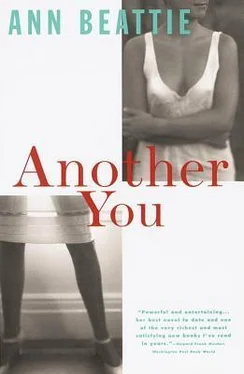Ann Beattie - Another You
Здесь есть возможность читать онлайн «Ann Beattie - Another You» весь текст электронной книги совершенно бесплатно (целиком полную версию без сокращений). В некоторых случаях можно слушать аудио, скачать через торрент в формате fb2 и присутствует краткое содержание. Год выпуска: 2014, Издательство: Vintage Books, Жанр: Современная проза, на английском языке. Описание произведения, (предисловие) а так же отзывы посетителей доступны на портале библиотеки ЛибКат.
- Название:Another You
- Автор:
- Издательство:Vintage Books
- Жанр:
- Год:2014
- ISBN:нет данных
- Рейтинг книги:5 / 5. Голосов: 1
-
Избранное:Добавить в избранное
- Отзывы:
-
Ваша оценка:
- 100
- 1
- 2
- 3
- 4
- 5
Another You: краткое содержание, описание и аннотация
Предлагаем к чтению аннотацию, описание, краткое содержание или предисловие (зависит от того, что написал сам автор книги «Another You»). Если вы не нашли необходимую информацию о книге — напишите в комментариях, мы постараемся отыскать её.
Another You — читать онлайн бесплатно полную книгу (весь текст) целиком
Ниже представлен текст книги, разбитый по страницам. Система сохранения места последней прочитанной страницы, позволяет с удобством читать онлайн бесплатно книгу «Another You», без необходимости каждый раз заново искать на чём Вы остановились. Поставьте закладку, и сможете в любой момент перейти на страницу, на которой закончили чтение.
Интервал:
Закладка:
Thinking fondly of her husband — relieved that she did, because for quite a while her thoughts had habitually turned, instead, to Tony — she went into the kitchen and made pancake batter. No assurance he’d have time to eat pancakes, unless she was unkind and woke him up after his stressful night sleepwalking, but if he did wake up, the batter would be there. Cracking an egg into the powdery mixture, she thought again about his doodles, and about the inked and pencilled puzzle, slightly sorry that instead of going to foreign films or going dancing — well, a few times, years ago in Boston, they had gone dancing — they now sat so many nights in front of the fire, settling for nothing but relaxation and wordless connection with one another. Strange, really, that while she felt comfortable with their pleasant domestic routines most of the time, at other times the sameness seemed oppressive. Just a day or so ago, she had complained to Tony about their evenings at home, yet when he had commiserated, calling them “your quotidian quotient,” she had become defensive. She had actually found herself talking about the solitary beauty of the second-growth pine, and of the birches, lit by the backyard spotlight, and if Tony hadn’t laughed, she would probably have continued: the mesmerizing fire in the fireplace; the complex patterns the shadows cast upon the wall. “I’m here to save you from your life of happy pretense,” Tony had said to her, clinking the rim of his coffee cup to hers. One thing about Tony was that he never minded overstepping his bounds — and when he had, he registered his glee by making a silent toast, or by flashing the V-for-victory sign. It was a mistake to confide in him, but also, for some reason, irresistible. Now she forced him out of her mind and finished stirring the batter.
She supposed she should be grateful she could keep such odd hours at the real estate business, communicating essentially by Post-it notes and taped messages, though the more she thought about it, it was possible she might appear both organized and brilliantly improvisational to Tony: certainly he had realized he was hiring an unconventional person, someone with a zigzagging past that slalomed his own. She had finished law school, flunked her exams the first time around, gotten sidetracked taking night courses in literature while keeping the books for a Boston electronics store for almost two years, then enrolled in a Harvard summer program she thought would teach her about new computer technology, which instead resulted in her retreat into the works of Jane Austen, followed by the rather unexpected promotion of Marshall to full professor at Benson College, their joyful decision to leave their apartment for a real house, followed by their having the good fortune to meet Tony Hembley at a friend’s summer wedding in the Adirondacks, where she spontaneously joined him at a rickety piano to accompany his accordion-played Cajun rendition of “Bosco Stomp.” More than half the guests were too drunk to understand what a weird spectacle was transpiring, though she and Tony had gotten it entirely: the inexplicable oddity of finding a soul mate in the unlikeliest place at the unlikeliest time, a kind of obligation, naturally, required of those thus blessed. “… Too stupid to pass the law boards,” she had said. “… So couldn’t imagine the rest of my life fastening suspenders to my pants and tying a noose with a rep tie. Just had to switch from Dean Witless to real estate,” he’d replied.
The house Tony found for them was half an hour from Tony’s own house, twenty minutes from Marshall’s job. The first time she had gone to Hembley and Hembley (Tony’s little joke; he was the sole owner of the business, but he felt he should acknowledge he was a Gemini) it had been as a client, the second as a buyer, the third as a prospective employee. “Why don’t you study and take the law boards a second time?” he’d said to her. “Why don’t you get rid of your trust-fund guilt and expand out of your parents’ converted garage?” she’d said. Checkmate: she passed the exam on her second try, then turned her attention to the next challenge and studied to become a real estate agent; he moved into a gargantuan church put up for auction by the Feds that sold far below market value. He had placed two gargoyles above the entranceway, painted the interior with richly pigmented Benjamin Moore historic colors, then written a long letter which was printed in the New York Times , indicting himself, as well as the system, for allowing people to take advantage, at the taxpayer’s expense, of expedient fire sales to unload properties following the collapse of the savings and loan industry. This resulted in his real estate business’s instant notoriety, plus the interest of a local congressman who took the occasion to speak for his constituents as being scandalized by the FDIC practices. The whole business became such a cause célèbre that the first day Sonja went to work for Tony, cameras recorded the employees’ entrance while TV reporters identified her as “a disaffected lawyer moving on to other things in the nineties.” The program ended with a close-up cut to the gargoyles, as a recording of Tony’s Cajun swing played in the background. Truth was, she was not so much disaffected as the repository for other people’s anxious desire to change their lives by moving from one place to another. Many clients appeared in extremis, the hysteria of selling and buying taking on a life of its own, people projecting wildly onto her so that she became their censorious parent, their skeptical employer, the devil himself if she questioned their financial stability. She forced Tony and the business out of her mind and walked upstairs to awaken Marshall.
“What’s the matter?” he said sleepily, as she rubbed her hand across his shoulders.
“Why should anything be the matter? I just thought you might want to get up and have some pancakes with me before I go off to work.”
“Winter,” he said.
“What?”
“No blueberries. Winter,” he said.
“This means you’re rejecting them?”
“Rejecting you and every idea you’ve ever had,” he said, reaching up and pulling her forward, so her face was close to his. He snuggled into her neck.
“You were sleepwalking last night,” she said.
“Wasn’t,” he said.
“You were.”
“You were dreaming,” he said.
How was it he could make her laugh just by contradicting her? Because he made her see that everything wasn’t so serious, she supposed. On the other hand, wouldn’t he be disturbed if he awoke to find her sitting by the window — wouldn’t he find it a little spooky? She did not do such things, he had already told her teasingly, because she exhibited good manners even in sleep. As he struggled up, she thought how young he seemed sometimes, hair awry, creases in his face made by lying on wrinkled sheets.
“Blueberry pancakes,” Marshall said. “It’s July. Seventy degrees out there, temperature climbing. Nice day to go rowing on the lake.”
“Are we going to do that this summer?” she said. “Last summer we only did it one time.”
“Next summer I build you a tree house, put in a grape arbor, don’t let the grass dry out, we go rowing at every opportunity.”
“I don’t want a grape arbor,” she said.
“You want a tree house?” he said, slightly surprised.
“What if I did? A sort of home office.”
“You like working at the House of Gargoyles too much,” he said. “I don’t believe you.”
“Do you believe I made pancakes?”
“You didn’t?” he said, rolling out of bed.
“I did. Big thrill, huh?”
“Yeah,” he said. “Now I’m hungry.”
She watched him walk to the bathroom, thinking how amazing it was that after all those years they had lived with the bathtub in the kitchen, now there was a large bathroom off the bedroom. It was only the fun — the mindless fun of those days she missed. Not the poorly heated, badly insulated apartments. Not the doctored canned spaghetti sauce, or the jugs of red wine that would taste, at best, as if they had no taste at all.
Читать дальшеИнтервал:
Закладка:
Похожие книги на «Another You»
Представляем Вашему вниманию похожие книги на «Another You» списком для выбора. Мы отобрали схожую по названию и смыслу литературу в надежде предоставить читателям больше вариантов отыскать новые, интересные, ещё непрочитанные произведения.
Обсуждение, отзывы о книге «Another You» и просто собственные мнения читателей. Оставьте ваши комментарии, напишите, что Вы думаете о произведении, его смысле или главных героях. Укажите что конкретно понравилось, а что нет, и почему Вы так считаете.












